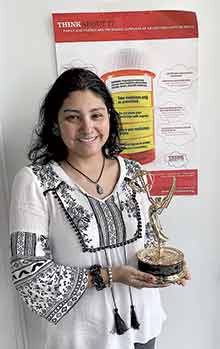
Meadowcreek High, and Nor-cross High are two she works with frequently, but in recent months she’s also been zeroing in on middle schools where students are at an even higher risk.
“Most people don’t know, but the middle schools are where the problem is, and so that’s where we are working now,” Plazas said.
Results from the most recent Georgia Student Health Survey (GSHS), show that a higher number of middle school students abuse prescription drugs than high school students do. Their findings show that students in grades as low as sixth are part of the ongoing prescription drug epidemic. More specifically, the GSHS Survey 2017-2018 study conducted at Duluth Middle School shows the percentage of students abusing prescription drugs had gone from .03 in 2017 to 0.73 in 2018 — a slight increase, but still, a warning bell.
Plazas has been doing this for a while. She began working in the drug abuse prevention field in 2010 and graduated from Argosy University with a Bachelor of Psychology with a concentration in substance in 2017. And in 2014, she was given her most challenging assignment yet — leading the GenRx project in Gwin-nett County.
Founded in 2013, the GenRx project was formed as a response to the opioid epidemic that has plagued the entire nation. And when The Georgia Department of Behavioral Health and Developmental Disabilities provided a federal grant from the Substance Abuse and Mental Health Services Administration to agencies in Catoosa, Early and Gwinnett, the ball started rolling. Their objective was to target and reduce prescription drug abuse amongst individuals between ages 12-25.
Gwinnett has the highest population of the selected areas, so when GenRx commissioned Plazas to spearhead the project, she found herself with the enormous task of educating a uniquely diverse population on the truth about prescription drug abuse.
When she started the campaign in 2013, Plazas selected Focus Groups for a Needs Assessment to indicate at-risk groups in the county. The Focus Groups showed that while other demographics had some knowledge of the epidemic, the His-panic community was at Level Zero, having no awareness of the prescription drug abuse epidemic.

Not one to rest on old laurels, Plazas launched the next phase of her project. Her new goal was to blast the message across the county so everyone would not only know a problem existed, but also understand how to overcome it.
“Even though there was some awareness, we still needed to increase awareness of prescription drug issue, because many don’t know what it really means or where it comes from,” Plazas explained.
And so, she amplified the message on English and Spanish television stations and through PSA’s on major radio stations including “The Bull” and “The Fish”. She placed billboards on both I-85 South and North where both locals and visitors to the county could plainly see them. And she placed ads in local papers and magazines for a multi-modal, mass-media tactic.
And to ensure she didn’t leave anyone out, Plazas devised a plan to reach English, Spanish, Gujarati, Urdu, Indi, Vietnamese and Korean speakers. Step-by-step instructions for proper disposal of old prescriptions were printed on pharmacy bags in each of these languages, and Plazas distributed them to independent pharmacies across the county. In 2018, she freely distributed more than 118,000 of these bags. But still, Plazas knew she had to do more, and so, she implemented the Haines model “Positive Social Norms Campaign”. Its focus is changing perceptions by sharing positive statistics.
For this campaign, Meadowcreek High School was her first stop. According to Plazas, the school had a bad reputation for high drug abuse. But this she knew to be wrong. And so, she made it her job to set the record straight.
“‘Did you know that 85 percent of students here [at Meadowcreek High School] don’t use prescription drugs without a doctor’s prescription or to get high?’“Plazas would ask during visits to the school. She based these messages on data collected from 400 surveys at the school which compared favorably with research from the GSHS. These findings are key to her objective of changing the perception of the school and community.
“Perception is everything, “Plazas said. “When we change perceptions, we can change behaviors.”
Working in the drug abuse prevention field for close to a decade, Plazas has extensive experience with all sides of the problem. She is completing an internship to become a Counselor with CETPA, where she heads the GenRx department. As a counselor, she will be able to provide treatment along with the preventative care she has been providing through GenRx.
Plazas works out of one of the largest drug addiction and mental health counseling centers that services the Hispanic population in the state of Georgia. With close to 40 counselors, CETPA is unique in its ability to provide bilingual treatment and prevention services to people across the Metro Atlanta area.
“Prevention, Intervention, Treatment, Recovery. Those are the stages of our process here at CETPA,” said Michelle Baroni, Prevention Clubhouse Director. “Prevention is the hardest process ever, but it’s so necessary. People want to spend all their resources on treatment because that’s where the issue is, but we need to prevent the issue to begin with. And so, we try foster the at-risk child who isn’t using drugs so that [he/she] will be fine.”
However, there is a treatment component to Plazas’ campaign, and more often than not, it’s geared towards the parents.
“For treatment, I work with the parents because some don’t even what drugs are out there. It’s not just street drugs you have to worry about. So, I introduce them to the topic of prescription drugs abuse and proper storage and disposal,” Plazas said.
The three primary objectives of the GenRx project are Education, Proper Medical Storage and Disposal and Enforcement. For the latter two, Plazas teams up with local police departments. The DEA plans two “Take Back Events” each year which she promotes inviting the community to hand over their old medications to the police for proper disposal.
“I cannot do [Take Back events] without the police, and we need an officer on duty to fill out the DEA application process for special disposal boxes,” Plazas said. “
Though her multi-media broadcasting approach, Plaza reached a total of 2,048,484 people according to her report for 2018.
“The numbers on the reports are a success, but it doesn’t feel the same as when someone comes in and says, ‘Thank you! You saved my son’s life!’ “Plazas said. “This program has given me a lot of those.”
In 2016, The Gwinnett Chapter of GenRx received an EMMY for their production of a 30-minute documentary about prescription drug abuse which is now available on YouTube. For information about CETPA’s other award-winning documentaries, or to learn more about GenRx in Gwinnett, visit http://www.cetpa.org.

